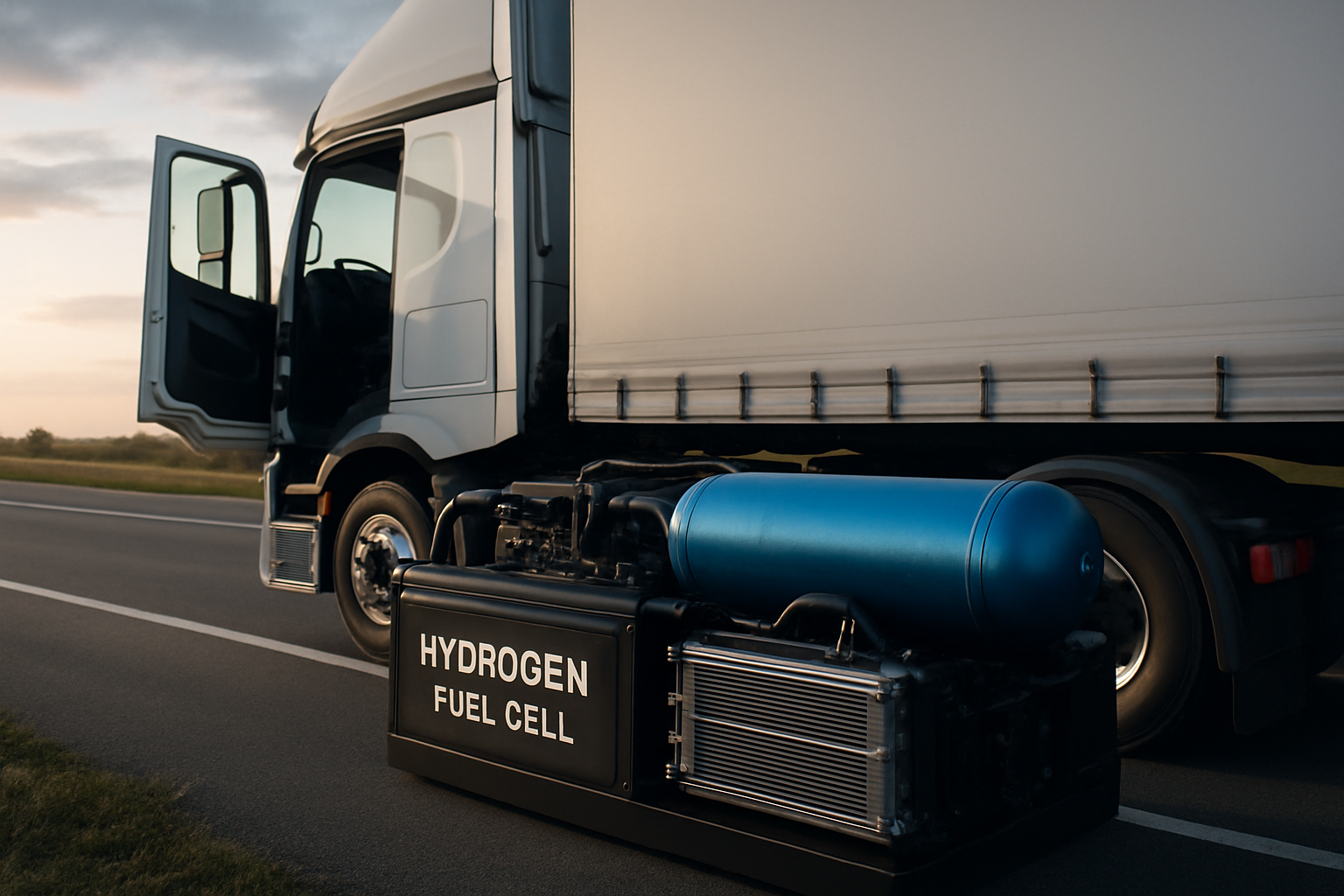Hydrogen Fuel Cells: Powering the Future of Long-Haul Trucking
The roar of diesel engines has long been the soundtrack of highways across the globe. But a quiet revolution is brewing in the world of long-haul trucking, one that promises to transform the industry's environmental footprint and operational efficiency. At the heart of this transformation lies an innovative technology that's been gaining traction: hydrogen fuel cells. This groundbreaking power source is poised to reshape the future of freight transportation, offering a compelling blend of sustainability, performance, and practicality.

The Science Behind Hydrogen Fuel Cells
At its core, a hydrogen fuel cell is an electrochemical device that converts hydrogen and oxygen into electricity, with water as the only byproduct. The process is elegant in its simplicity: hydrogen gas is fed into the anode side of the fuel cell, where it’s split into protons and electrons. The protons pass through a membrane to the cathode side, while the electrons are forced through an external circuit, generating electricity. On the cathode side, oxygen from the air combines with the protons and electrons to form water.
This clean, efficient process offers several advantages over traditional internal combustion engines. Fuel cells have no moving parts, which means less wear and tear and potentially lower maintenance costs. They’re also significantly more energy-efficient than diesel engines, converting a higher percentage of the fuel’s energy into usable power.
Long-Haul Trucking: The Perfect Application
The long-haul trucking sector presents a unique set of challenges that hydrogen fuel cells are particularly well-suited to address. Unlike battery-electric vehicles, which can take hours to recharge, hydrogen-powered trucks can be refueled in a matter of minutes—a critical factor for an industry where time is quite literally money. Moreover, hydrogen fuel cells offer a range comparable to diesel trucks, eliminating the range anxiety that plagues battery-electric alternatives.
Weight is another crucial consideration in the trucking industry, where every pound of vehicle weight translates to a pound less cargo capacity. Hydrogen fuel cell systems, while not lightweight, offer a better power-to-weight ratio than comparable battery systems for long-range applications. This means that hydrogen-powered trucks can maintain payload capacity similar to their diesel counterparts, a significant advantage in a highly competitive industry.
Infrastructure: The Road Ahead
One of the most significant hurdles facing the widespread adoption of hydrogen fuel cell trucks is the lack of fueling infrastructure. Unlike the ubiquitous network of diesel stations, hydrogen fueling stations are still few and far between. However, this is rapidly changing. Several countries, including Germany, Japan, and South Korea, are investing heavily in hydrogen infrastructure. In the United States, California is leading the charge, with plans to have 200 hydrogen fueling stations operational by 2025.
The chicken-and-egg problem of infrastructure development versus vehicle adoption is being addressed through strategic partnerships between truck manufacturers, energy companies, and government entities. These collaborations are focused on developing hydrogen corridors—strategic routes equipped with fueling stations to support long-haul trucking operations.
Environmental Impact and Energy Independence
The environmental benefits of hydrogen fuel cell trucks are substantial. When powered by green hydrogen—produced using renewable energy sources—these vehicles offer a truly zero-emission solution for freight transportation. This potential for dramatic reduction in carbon emissions is particularly significant given that the transportation sector is one of the largest contributors to greenhouse gas emissions globally.
Beyond environmental considerations, the adoption of hydrogen fuel cell technology in trucking has implications for energy independence. Countries with abundant renewable energy resources could potentially produce their own hydrogen fuel, reducing reliance on imported fossil fuels and enhancing energy security.
Challenges and Technological Advancements
While the potential of hydrogen fuel cells in long-haul trucking is immense, several challenges remain. The cost of fuel cell systems and hydrogen fuel production needs to decrease to achieve cost parity with diesel. Additionally, the durability and longevity of fuel cell systems in the demanding environment of long-haul trucking must be proven.
However, rapid technological advancements are addressing these challenges. Innovations in catalyst materials are reducing the amount of expensive platinum required in fuel cells, while advancements in hydrogen production techniques, such as high-temperature electrolysis, are improving efficiency and reducing costs. Manufacturers are also making strides in fuel cell durability, with some systems now capable of operating for over 25,000 hours—equivalent to more than a million miles of driving.
The Road to Commercialization
Several major truck manufacturers have recognized the potential of hydrogen fuel cells and are investing heavily in the technology. Daimler Truck and Volvo Group have formed a joint venture to develop fuel cell systems for heavy-duty vehicles, while Toyota and Kenworth have partnered to test hydrogen-powered trucks in port operations. These initiatives are moving the technology from prototype to commercial reality.
Early adopters in the logistics industry are already piloting hydrogen fuel cell trucks in real-world operations. These pilot programs are providing valuable data on performance, reliability, and operational costs, paving the way for broader adoption.
A Hydrogen-Powered Horizon
The integration of hydrogen fuel cell technology into long-haul trucking represents a paradigm shift in how we approach freight transportation. It offers a compelling solution to the industry’s environmental challenges while maintaining the operational efficiency that’s crucial to the global supply chain.
As infrastructure expands, costs decrease, and technology improves, we can expect to see more hydrogen-powered trucks on our highways. This transition won’t happen overnight, but the momentum is building. The quiet hum of fuel cell trucks may soon become as familiar as the rumble of diesel engines, heralding a new era of clean, efficient, and sustainable long-haul trucking.
The road ahead for hydrogen fuel cells in trucking is long and challenging, but the destination—a cleaner, more sustainable future for freight transportation—is well worth the journey. As this technology continues to evolve, it’s clear that hydrogen fuel cells will play a pivotal role in shaping the future of long-haul trucking and, by extension, the global logistics landscape.






